大学综合英语第二册基础英语2何兆熊课文及译文7LettertoaBstudent
- 格式:docx
- 大小:25.69 KB
- 文档页数:5
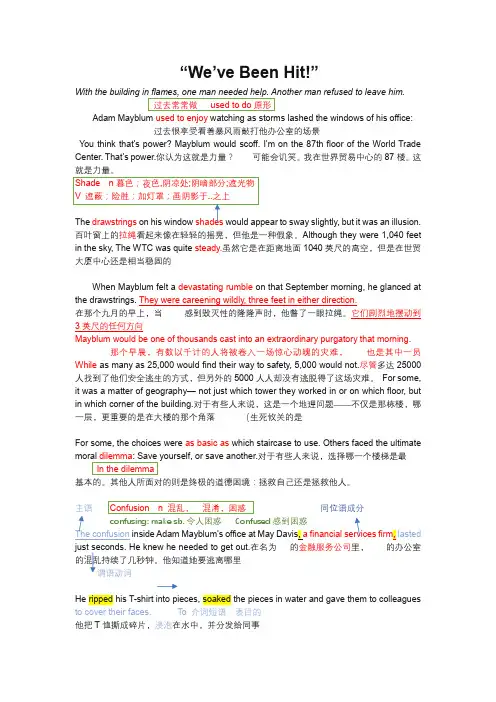
“We’ve Been Hit!”Adam Mayblum used to enjoy watching as storms lashed the windows of his office:过去很享受看着暴风雨敲打他办公室的场景You think that’s power? Mayblum would scoff. I’m on the 87th floor of the World Trade Center. That’s power.你认为这就是力量?可能会讥笑。
我在世界贸易中心的87楼。
这就是力量。
百叶窗上的拉绳看起来像在轻轻的摇晃,但他是一种假象。
Although they were 1,040 feet in the sky, The WTC was quite steady.虽然它是在距离地面1040英尺的高空,但是在世贸大厦中心还是相当稳固的When Mayblum felt a devastating rumble on that September morning, he glanced at the drawstrings. They were careening wildly, three feet in either direction.在那个九月的早上,当感到毁灭性的隆隆声时,他瞥了一眼拉绳。
它们剧烈地摆动到3英尺的任何方向Mayblum would be one of thousands cast into an extraordinary purgatory that morning.那个早晨,有数以千计的人将被卷入一场惊心动魄的灾难,也是其中一员While as many as 25,000 would find their way to safety, 5,000 would not.尽管多达25000人找到了他们安全逃生的方式,但另外的5000人人却没有逃脱得了这场灾难。
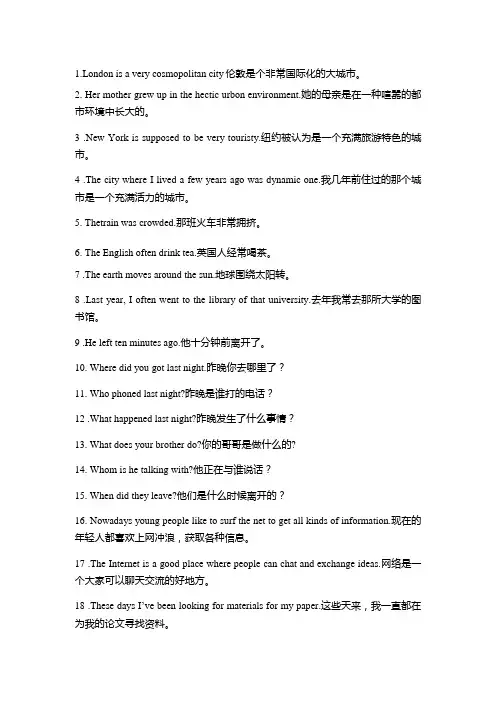
1.London is a very cosmopolitan city伦敦是个非常国际化的大城市。
2. Her mother grew up in the hectic urbon environment.她的母亲是在一种喧嚣的都市环境中长大的。
3 .New York is supposed to be very touristy.纽约被认为是一个充满旅游特色的城市。
4 .The city where I lived a few years ago was dynamic one.我几年前住过的那个城市是一个充满活力的城市。
5. Thetrain was crowded.那班火车非常拥挤。
6. The English often drink tea.英国人经常喝茶。
7 .The earth moves around the sun.地球围绕太阳转。
8 .Last year, I often went to the library of that university.去年我常去那所大学的图书馆。
9 .He left ten minutes ago.他十分钟前离开了。
10. Where did you got last night.昨晚你去哪里了?11. Who phoned last night?昨晚是谁打的电话?12 .What happened last night?昨晚发生了什么事情?13. What does your brother do?你的哥哥是做什么的?14. Whom is he talking with?他正在与谁说话?15. When did they leave?他们是什么时候离开的?16. Nowadays young people like to surf the net to get all kinds of information.现在的年轻人都喜欢上网冲浪,获取各种信息。
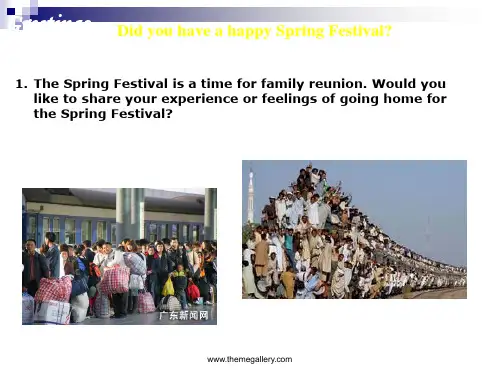
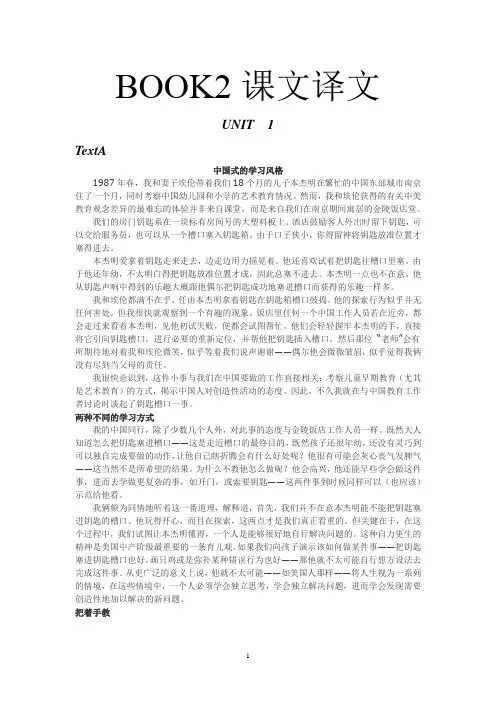
BOOK2课文译文UNIT 1TextA中国式的学习风格1987年春,我和妻子埃伦带着我们18个月的儿子本杰明在繁忙的中国东部城市南京住了一个月,同时考察中国幼儿园和小学的艺术教育情况。
然而,我和埃伦获得的有关中美教育观念差异的最难忘的体验并非来自课堂,而是来自我们在南京期间寓居的金陵饭店堂。
我们的房门钥匙系在一块标有房间号的大塑料板上。
酒店鼓励客人外出时留下钥匙,可以交给服务员,也可以从一个槽口塞入钥匙箱。
由于口子狭小,你得留神将钥匙放准位置才塞得进去。
本杰明爱拿着钥匙走来走去,边走边用力摇晃着。
他还喜欢试着把钥匙往槽口里塞。
由于他还年幼,不太明白得把钥匙放准位置才成,因此总塞不进去。
本杰明一点也不在意。
他从钥匙声响中得到的乐趣大概跟他偶尔把钥匙成功地塞进槽口而获得的乐趣一样多。
我和埃伦都满不在乎,任由本杰明拿着钥匙在钥匙箱槽口鼓捣。
他的探索行为似乎并无任何害处。
但我很快就观察到一个有趣的现象。
饭店里任何一个中国工作人员若在近旁,都会走过来看着本杰明,见他初试失败,便都会试图帮忙。
他们会轻轻握牢本杰明的手,直接将它引向钥匙槽口,进行必要的重新定位,并帮他把钥匙插入槽口。
然后那位“老师”会有所期待地对着我和埃伦微笑,似乎等着我们说声谢谢——偶尔他会微微皱眉,似乎觉得我俩没有尽到当父母的责任。
我很快意识到,这件小事与我们在中国要做的工作直接相关:考察儿童早期教育(尤其是艺术教育)的方式,揭示中国人对创造性活动的态度。
因此,不久我就在与中国教育工作者讨论时谈起了钥匙槽口一事。
两种不同的学习方式我的中国同行,除了少数几个人外,对此事的态度与金陵饭店工作人员一样。
既然大人知道怎么把钥匙塞进槽口——这是走近槽口的最终目的,既然孩子还很年幼,还没有灵巧到可以独自完成要做的动作,让他自己瞎折腾会有什么好处呢?他很有可能会灰心丧气发脾气——这当然不是所希望的结果。
为什么不教他怎么做呢?他会高兴,他还能早些学会做这件事,进而去学做更复杂的事,如开门,或索要钥匙——这两件事到时候同样可以(也应该)示范给他看。
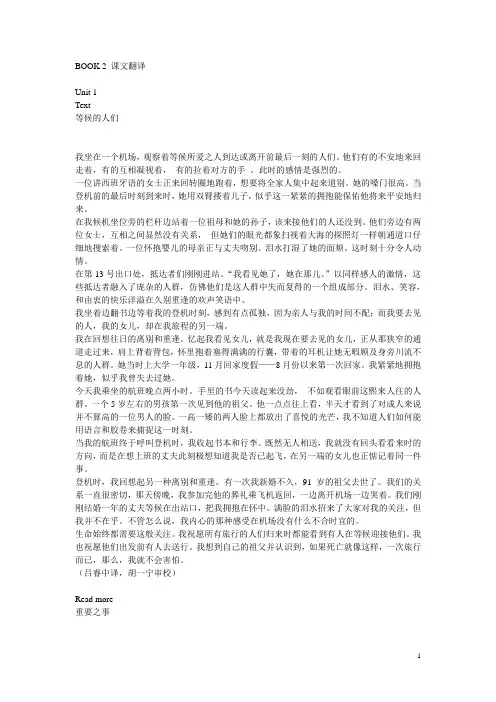
BOOK 2 课文翻译Unit 1Text等候的人们我坐在一个机场,观察着等候所爱之人到达或离开前最后一刻的人们。
他们有的不安地来回走着,有的互相凝视着,有的拉着对方的手。
此时的感情是强烈的。
一位讲西班牙语的女士正来回转圈地跑着,想要将全家人集中起来道别。
她的嗓门很高。
当登机前的最后时刻到来时,她用双臂搂着儿子,似乎这一紧紧的拥抱能保佑他将来平安地归来。
在我候机坐位旁的栏杆边站着一位祖母和她的孙子,该来接他们的人还没到。
他们旁边有两位女士,互相之间显然没有关系,但她们的眼光都象扫视着大海的探照灯一样朝通道口仔细地搜索着。
一位怀抱婴儿的母亲正与丈夫吻别。
泪水打湿了她的面颊。
这时刻十分令人动情。
在第13号出口处,抵达者们刚刚进站。
“我看见她了,她在那儿。
”以同样感人的激情,这些抵达者融入了庞杂的人群,仿佛他们是这人群中失而复得的一个组成部分。
泪水、笑容,和由衷的快乐洋溢在久别重逢的欢声笑语中。
我坐着边翻书边等着我的登机时刻,感到有点孤独,因为亲人与我的时间不配;而我要去见的人,我的女儿,却在我旅程的另一端。
我在回想往日的离别和重逢。
忆起我看见女儿,就是我现在要去见的女儿,正从那狭窄的通道走过来,肩上背着背包,怀里抱着塞得满满的行囊,带着的耳机让她无暇顾及身旁川流不息的人群。
她当时上大学一年级,11月回家度假——8月份以来第一次回家。
我紧紧地拥抱着她,似乎我曾失去过她。
今天我乘坐的航班晚点两小时。
手里的书今天读起来没劲,不如观看眼前这熙来人往的人群。
一个5岁左右的男孩第一次见到他的祖父。
他一点点往上看,半天才看到了对成人来说并不算高的一位男人的脸。
一高一矮的两人脸上都放出了喜悦的光芒,我不知道人们如何能用语言和胶卷来捕捉这一时刻。
当我的航班终于呼叫登机时,我收起书本和行李。
既然无人相送,我就没有回头看看来时的方向,而是在想上班的丈夫此刻极想知道我是否已起飞,在另一端的女儿也正惦记着同一件事。
登机时,我回想起另一种离别和重逢。
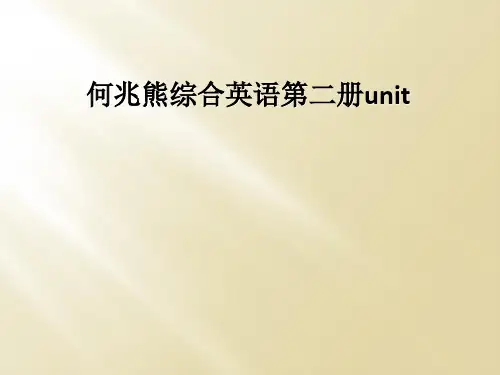
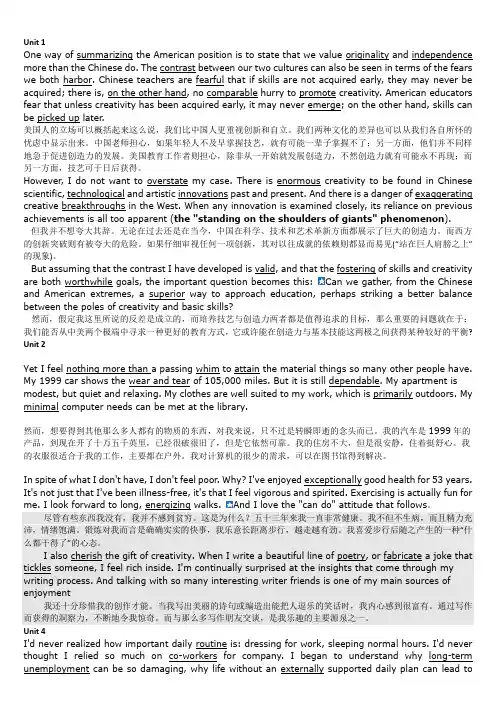
Unit 1One way of summarizing the American position is to state that we value originality and independence more than the Chinese do. The contrast between our two cultures can also be seen in terms of the fears we both harbor. Chinese teachers are fearful that if skills are not acquired early, they may never be acquired; there is, on the other hand, no comparable hurry to promote creativity. American educators fear that unless creativity has been acquired early, it may never emerge; on the other hand, skills can be picked up later.美国人的立场可以概括起来这么说,我们比中国人更重视创新和自立。
我们两种文化的差异也可以从我们各自所怀的忧虑中显示出来。
中国老师担心,如果年轻人不及早掌握技艺,就有可能一辈子掌握不了;另一方面,他们并不同样地急于促进创造力的发展。
美国教育工作者则担心,除非从一开始就发展创造力,不然创造力就有可能永不再现;而另一方面,技艺可于日后获得。
However, I do not want to overstate my case. There is enormous creativity to be found in Chinese scientific, technological and artistic innovations past and present. And there is a danger of exaggerating creative breakthroughs in the West. When any innovation is examined closely, its reliance on previous achievements is all too apparent (the "standing on the shoulders of giants" phenomenon).但我并不想夸大其辞。

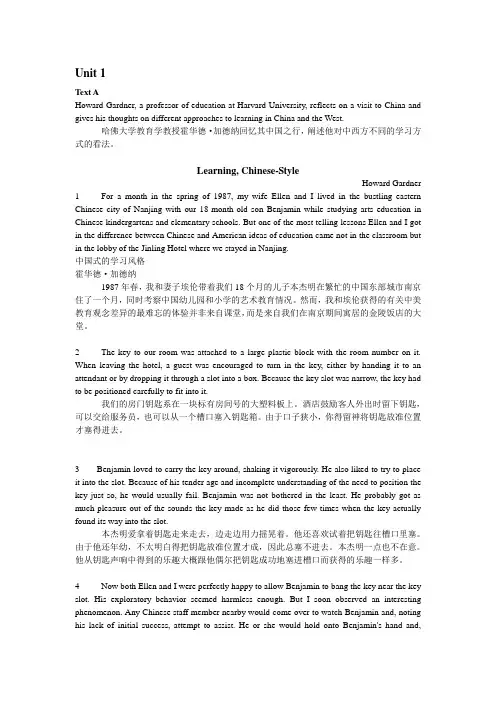
Unit 1Text AHoward Gardner, a professor of education at Harvard University, reflects on a visit to China and gives his thoughts on different approaches to learning in China and the West.哈佛大学教育学教授霍华德·加德纳回忆其中国之行,阐述他对中西方不同的学习方式的看法。
Learning, Chinese-StyleHoward Gardner 1 For a month in the spring of 1987, my wife Ellen and I lived in the bustling eastern Chinese city of Nanjing with our 18-month-old son Benjamin while studying arts education in Chinese kindergartens and elementary schools. But one of the most telling lessons Ellen and I got in the difference between Chinese and American ideas of education came not in the classroom but in the lobby of the Jinling Hotel where we stayed in Nanjing.中国式的学习风格霍华德·加德纳1987年春,我和妻子埃伦带着我们18个月的儿子本杰明在繁忙的中国东部城市南京住了一个月,同时考察中国幼儿园和小学的艺术教育情况。
然而,我和埃伦获得的有关中美教育观念差异的最难忘的体验并非来自课堂,而是来自我们在南京期间寓居的金陵饭店的大堂。
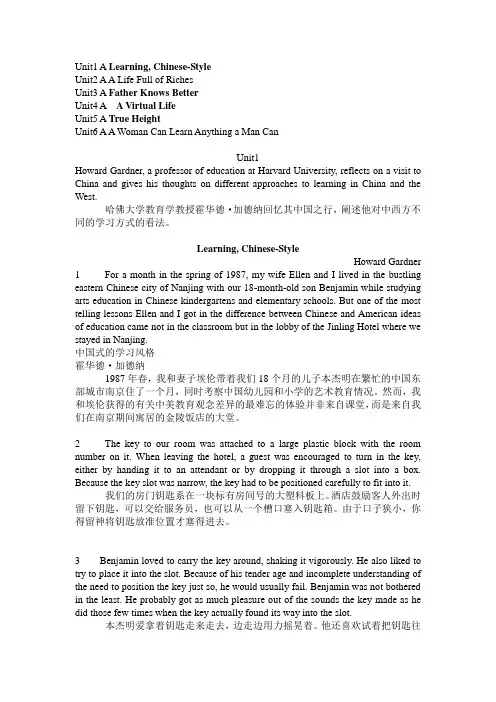
Unit1 A Learning, Chinese-StyleUnit2 A A Life Full of RichesUnit3 A Father Knows BetterUnit4 A A Virtual LifeUnit5 A True HeightUnit6 A A Woman Can Learn Anything a Man CanUnit1Howard Gardner, a professor of education at Harvard University, reflects on a visit to China and gives his thoughts on different approaches to learning in China and the West.哈佛大学教育学教授霍华德·加德纳回忆其中国之行,阐述他对中西方不同的学习方式的看法。
Learning, Chinese-StyleHoward Gardner 1 For a month in the spring of 1987, my wife Ellen and I lived in the bustling eastern Chinese city of Nanjing with our 18-month-old son Benjamin while studying arts education in Chinese kindergartens and elementary schools. But one of the most telling lessons Ellen and I got in the difference between Chinese and American ideas of education came not in the classroom but in the lobby of the Jinling Hotel where we stayed in Nanjing.中国式的学习风格霍华德·加德纳1987年春,我和妻子埃伦带着我们18个月的儿子本杰明在繁忙的中国东部城市南京住了一个月,同时考察中国幼儿园和小学的艺术教育情况。

Unit 1Text AHoward Gardner, a professor of education at Harvard University, reflects on a visit to China and gives his thoughts on different approaches to learning in China and the West.哈佛大学教育学教授霍华德·加德纳回忆其中国之行,阐述他对中西方不同的学习方式的看法。
Learning, Chinese-StyleHoward Gardner 1 For a month in the spring of 1987, my wife Ellen and I lived in the bustling eastern Chinese city of Nanjing with our 18-month-old son Benjamin while studying arts education in Chinese kindergartens and elementary schools. But one of the most telling lessons Ellen and I got in the difference between Chinese and American ideas of education came not in the classroom but in the lobby of the Jinling Hotel where we stayed in Nanjing.中国式的学习风格霍华德·加德纳1987年春,我和妻子埃伦带着我们18个月的儿子本杰明在繁忙的中国东部城市南京住了一个月,同时考察中国幼儿园和小学的艺术教育情况。
然而,我和埃伦获得的有关中美教育观念差异的最难忘的体验并非来自课堂,而是来自我们在南京期间寓居的金陵饭店的大堂。
新标准⼤学英语综合教程2_课⽂翻译Unit 14 Translate the sentences into Chinese.1 On university campuses in Europe, mass socialist or communist movements gave rise to increasingly violent clashes between the establishment and the college students, with their new and passionate commitment to freedom and justice.在欧洲的⼤学校园⾥,⼤学⽣以新的姿态和激情地投⼊到⾃由和正义的事业中去,⼤规模的社会主义或共产主义运动引发了他们与当权者之间⽇益升级的暴⼒冲突。
2 These days political, social and creative awakening seems to happen not because of college, but in spiteof it. Of course, it’s true that higher education is still important. For example, in the UK, Prime MinisterBlair was close to achieving his aim of getting 50 per cent of all under thirties into college by 2010 (eventhough a cynic would say that this was to keep them off the unemployment statistics).现在,政治、社会和创造意识的觉醒似乎不是凭借⼤学的助⼒,⽽是冲破其阻⼒才发⽣的。
One way of summarizing the American position is to state that we value originality and independence more than the Chinese do. The contrast between our two cultures can also be seen in terms of the fears we both harbor. Chinese teachers are fearful that if skills are not acquired early, they may never be acquired; there is, on the other hand, no comparable hurry to promote creativity. American educators fear that unless creativity has been acquired early, it may never emerge; on the other hand, skills can be picked up later.However, I do not want to overstate my case. There is enormous creativity to be found in Chinese scientific, technological and artistic innovations past and present. And there is a danger of exaggerating creative breakthroughs in the West. When any innovation is examined closely, its reliance on previous achievements is all too apparent (the "standing on the shoulders of giants" phenomenon).But assuming that the contrast I have developed is valid, and that the fostering of skills and creativity are both worthwhile goals, the important question becomes this: Can we gather, from the Chinese and American extremes, a superior way to approach education, perhaps striking a better balance between the poles of creativity and basic skills?Walton set up a college scholarship fund for employees' children, a disaster relief fund to rebuild employee homes damaged by fires, floods, tornadoes, and the like. He believed in cultivating ideas and rewarding success."He'd say, 'That fellow worked hard, let's give him a little extra,'" recalls retired president Ferold F. Arend, who was stunned at such generosity after the stingy employer he left to join Wal-Mart. "I had to change my way of thinking when I came aboard.""The reason for our success," says Walton, in a company handout, "is our people and the way they're treated and the way they feel about their company. They believe things are different here, but they deserve the credit."Adds company lawyer Jim Hendren: "I've never seen anyone yet who worked for him or was around him for any length of time who wasn't better off. And I don't mean just financially, although a lot of people are. It's just something about him -- coming into contact with Sam Walton just makes you a better person."Making the journey from log cabin to White House is part of the American Dream. But when Jimmy Carter was defeated in his attempt to gain a second term as President of the United States he found himself suddenly thrown out of the White House and back in his log cabin. This is how he coped.SEAN: If that sort of thing happened only once in a while, it wouldn't be so bad. Overall, I wouldn't want to trade my dad for anyone else's. He loves us kids and Mom too. But I think that's sometimes the problem. He wants to do things for us, things he thinks are good. But he needs to give them more thought because:SEAN, HEIDI and DIANE: (In unison) Father knows better!(The lights quickly fade to black and then come up a second or two later. DIANE stands alone at the Down Right edge of the stage. HEIDI and SEAN enter Down Left and cross to the edge of the stage. )DIANE: Can you imagine how humiliated I was? An honor student, class president. And Father was out asking people to have their sons call and ask me to the prom! But that's dear old dad. Actually, he is a dear. He just doesn't stop to think. And it's not just one of us who've felt the heavy hand of interference. Oh, no, all three of us live in constant dread knowing that at any time disaster can strike because: Father knows better.I'd never realized how important daily routine is: dressing for work, sleeping normal hours. I'd never thought I relied so much on co-workers for company. I began to understand why long-term unemployment can be so damaging, why life without an externally supported daily plan can lead to higher rates of drug abuse, crime, suicide.To restore balance to my life, I force myself back into the real world. I call people, arrange to meet with the few remaining friends who haven't fled New York City. I try to at least get to the gym, so as to set apart the weekend from the rest of my week. I arrange interviews for stories, doctor's appointments -- anything to get me out of the house and connected with others.But sometimes being face to face is too much. I see a friend and her ringing laughter is intolerable -- the noise of conversation in the restaurant, unbearable. I make my excuses and flee. I re-enter my apartment and run to the computer as though it were a place of safety.I click on the modem, the once-annoying sound of the connection now as pleasant as my favorite tune. I enter my password. The real world disappears.Thought you were safe sharing secrets with Internet friends? Wait for the doorbell...The runway felt different this time. It startled him for a brief moment. Then it all hit him like a wet bale of hay. The bar was set at nine inches higher than his personal best. That's only one inch off the National record, he thought. The intensity of the moment filled his mind with anxiety. He began shaking the tension. It wasn't working. He became more tense. Why was this happening to him now, he thought. He began to get nervous. Afraid would be a more accurate description. What was he going to do? He had never experienced these feelings. Then out of nowhere, and from the deepest depths of his soul, he pictured his mother. Why now? What was his mother doing in his thoughts at a time like this? It was simple. His mother always used to tell him when you felt tense, anxious or even scared, take deep breaths.So he did. Along with shaking the tension from his legs, he gently laid his pole at his feet. He began to stretch out his arms and upper body. The light breeze that was once there was now gone. He carefully picked up his pole. He felt his heart pounding. He was sure the crowd did, too. The silence was deafening. When he heard the singing of some distant birds in flight, he knew it was his time to fly.Racing the clock every day is such an exhausting effort that when I actually have a few free moments, I tend to collapse. Mostly I sink into a chair and stare into space while I imagine how lovely life would be if only I possessed the organizational skills and the energy of my superheroines. In fact, I waste a good deal of my spare time just worrying about what other women are accomplishing in theirs. Sometimes I think that these modern fairy tales create as many problems for women as the old stories that had us biding our time for the day our prince would come.Yet superwomen tales continue to charm me. Despite my friend's warning against being taken in, despite everything I've learned, I find that I'm not only willing, but positively eager to buy that bridge she mentioned. Why? I suppose it has something to do with the appeal of an optimistic approach to life -- and the fact that extraordinary deeds have been accomplished by determined individuals who refused to believe that "you can't" was the final word on their dreams.Men have generally been assured that achieving their heart's desires would be a piece of cake. Women, of course, have always believed that we can't have our cake and eat it too-the old low-dream diet. Perhaps becoming a superwoman is an impossible dream for me, but life without that kind of fantasy is as unappealing as a diet with no treats.1) The young woman described to the policemen the way the man ran up to her and grabbed the bag from her hand. 2) All the people working for Sam Walton admire the way he manages Wal-Mart and the way he treats his employees. 3) The neighbors were disgusted at the way he talked to his old father.4) It's amazing the way the eight-year-old boy managed to stay so calm when he faced the emergency.1. You will find yourself penniless in a month.2. He found himself lying in a hospital ward.3. She found herself faced with the toughest job she had ever taken.4. Susan found herself in a trap from which she could not escape.1) Obviously what the speaker wanted to emphasize was the impact of these findings rather than the process that led to these findings.2) It seems that he is never bothered about what people would think about his behavior.3) The CEO never hesitates to let his employees know what he is planning for the company.4) The scientist will show the audience what a tele-operated robot can do for a family.5)Despite all this she manages to get her act together.1、She herself believed in freedom,so much so that she would rather die than live without it.2、Assuming the proposal is accepted,where are we going to get the money?3、Only by rewarding success can you bring out the best in your employess.4、It’s amazing the eight-year-old boy managed to stay so calm when he faced the emergency.5、Allen should have known better than to lend such a large sum of money to that untrustworthy cousin of his.。
Unit1One way of summarizing the American position is to state that we value originality and independence more than the Chinese do. The contrast between our two cultures can also be seen in terms of the fears we both harbor. Chinese teachers are fearful that if skills are not acquired early, they may never be acquired; there is, on the other hand, no comparable hurry to promote creativity. American educators fear that unless creativity has been acquired early, it may never emerge; on the other hand, skills can be picked up later.However, I do not want to overstate my case. There is enormous creativity to be found in Chinese scientific, technological and artistic innovations past and present. And there is a danger of exaggerating creative breakthroughs in the West. When any innovation is examined closely, its reliance on previous achievements is all too apparent (the "standing on the shoulders of giants" phenomenon).But assuming that the contrast I have developed is valid, and that the fostering of skills and creativity are both worthwhile goals, the important question becomes this: Can we gather, from the Chinese and American extremes, a superior way to approach education, perhaps striking a better balance between the poles of creativity and basic skills?Unit2Walton set up a college scholarship fund for employees' children, a disaster relief fund to rebuild employee homes damaged by fires, floods, tornadoes, and the like. He believed in cultivating ideas and rewarding success."He'd say, 'That fellow worked hard, let's give him a little extra,'" recalls retired president Ferold F. Arend, who was stunned at such generosity after the stingy employer he left to join Wal-Mart. "I had to change my way of thinking when I came aboard.""The reason for our success," says Walton, in a company handout, "is our people and the way they're treated and the way they feel about their company. They believe things are different here, but they deserve the credit."Adds company lawyer Jim Hendren: "I've never seen anyone yet who worked for him or was around him for any length of time who wasn't better off. And I don't mean just financially, although a lot of people are. It's just something about him -- coming into contact with Sam Walton just makes you a better person."Making the journey from log cabin to White House is part of the American Dream. But when Jimmy Carter was defeated in his attempt to gain a second term as President of the United States he found himself suddenly thrown out of the White House and back in his log cabin. This is how he coped.Unit3SEAN: If that sort of thing happened only once in a while, it wouldn't be so bad. Overall, I wouldn't want to trade my dad for anyone else's. He loves us kids and Mom too. But I think that's sometimes the problem. He wants to do things for us, things he thinks are good. But he needs to give them more thought because:SEAN, HEIDI and DIANE: (In unison) Father knows better!(The lights quickly fade to black and then come up a second or two later. DIANE stands alone at the Down Right edge of the stage. HEIDI and SEAN enter Down Left and cross to the edge of the stage. )DIANE: Can you imagine how humiliated I was? An honor student, class president. And Father was out asking people to have their sons call and ask me to the prom! But that's dear old dad. Actually, he is a dear. He just doesn't stop to think. And it's not just one of us who've felt the heavy hand of interference. Oh, no, all three of us live in constant dread knowing that at any time disaster can strike because: Father knows better.Unit4I'd never realized how important daily routine is: dressing for work, sleeping normal hours. I'd never thought I relied so much on co-workers for company. I began to understand why long-term unemployment can be so damaging, why life without an externally supported daily plan can lead to higher rates of drug abuse, crime, suicide.To restore balance to my life, I force myself back into the real world. I call people, arrange to meet with the few remaining friends who haven't fled New York City. I try to at least get to the gym, so as to set apart the weekend from the rest of my week. I arrange interviews for stories, doctor's appointments -- anything to get me out of the house and connected with others.But sometimes being face to face is too much. I see a friend and her ringing laughter is intolerable -- the noise of conversation in the restaurant, unbearable. I make my excuses and flee. I re-enter my apartment and run to the computer as though it were a place of safety.I click on the modem, the once-annoying sound of the connection now as pleasant as my favorite tune. I enter my password. The real world disappears.Thought you were safe sharing secrets with Internet friends? Wait for the doorbell...Unit5The runway felt different this time. It startled him for a brief moment. Then it all hit him like a wet bale of hay. The bar was set at nine inches higher than his personal best. That's only one inch off the National record, he thought. The intensity of the moment filled his mind with anxiety. He began shaking the tension. It wasn't working. He became more tense. Why was this happening to him now, he thought. He began to get nervous. Afraid would be a more accurate description. What was he going to do? He had never experienced these feelings. Then out of nowhere, and from the deepest depths of his soul, he pictured his mother. Why now? What was his mother doing in his thoughts at a time like this? It was simple.His mother always used to tell him when you felt tense, anxious or even scared, take deep breaths.So he did. Along with shaking the tension from his legs, he gently laid his pole at his feet. He began to stretch out his arms and upper body. The light breeze that was once there was now gone. He carefully picked up his pole. He felt his heart pounding. He was sure the crowd did, too. The silence was deafening. When he heard the singing of some distant birds in flight, he knew it was his time to fly.Unit6Racing the clock every day is such an exhausting effortthat when I actually have a few free moments, I tend to collapse. Mostly I sink into a chair and stare into space while I imagine how lovely life would be if only I possessed the organizational skills and the energy of my superheroines. In fact, I waste a good deal of my spare time just worrying about what other women are accomplishing in theirs. Sometimes I think that these modern fairy tales create as many problems for women as the old stories that had us biding our time for the day our prince would come.Yet superwomen tales continue to charm me. Despite my friend's warning against being taken in, despite everything I've learned, I find that I'm not only willing, but positively eager to buy that bridge she mentioned. Why? I suppose it has something to do with the appeal of an optimistic approach to life -- and the fact that extraordinary deeds have been accomplished by determined individuals who refused to believe that "you can't" was the final word on their dreams.Men have generally been assured that achieving their heart's desires would be a piece of cake. Women, of course, have always believed that we can't have our cake and eat it too-the old low-dream diet. Perhaps becoming a superwoman is an impossible dream for me, but life without that kind of fantasy is as unappealing as a diet with no treats.1) The young woman described to the policemen the way the man ran up to her and grabbed the bag from her hand. 2) All the people working for Sam Walton admire the way he manages Wal-Mart and the way he treats his employees. 3) The neighbors were disgusted at the way he talked to his old father.4) It's amazing the way the eight-year-old boy managed to stay so calm when he faced the emergency.1. You will find yourself penniless in a month.2. He found himself lying in a hospital ward.3. She found herself faced with the toughest job she had ever taken.4. Susan found herself in a trap from which she could not escape.1) Obviously what the speaker wanted to emphasize was the impact of these findings rather than the process that led to these findings.2) It seems that he is never bothered about what people would think about his behavior.3) The CEO never hesitates to let his employees know what he is planning for the company.4) The scientist will show the audience what a tele-operated robot can do for a family.5)Despite all this she manages to get her act together.1、She herself believed in freedom,so much so that she would rather die than live without it.2、Assuming the proposal is accepted,where are we going to get the money?3、Only by rewarding success can you bring out the best in your employess.4、It’s amazing the eight-year-old boy managed to stay so calm when he faced the emergency.5、Allen should have known better than to lend such a large sum of money to that untrustworthy cousin of his.。
全新版大学英语第二版综合教程2课文及翻译《全新版大学英语第二版综合教程 2 课文及翻译》大学英语学习对于当代大学生来说至关重要,而全新版大学英语第二版综合教程 2 则是众多英语教材中的经典之作。
这本教程中的课文涵盖了丰富多样的主题,从人文社科到自然科学,从日常生活到国际事务,为学生提供了广阔的知识视野和语言学习素材。
在课文方面,它精心挑选了一系列具有代表性和启发性的文章。
比如,有讲述友谊真谛的篇章,通过细腻的描写和生动的故事,让我们深刻体会到真正的友谊是如何在困难时刻给予支持和温暖。
还有探讨科技发展对社会影响的内容,使我们能够思考科技进步带来的利弊,以及如何在科技浪潮中保持清醒的头脑和正确的价值观。
其中一篇关于文化差异的课文给我留下了深刻的印象。
作者通过对比不同国家的风俗习惯、思维方式和社交礼仪,让我们清晰地看到文化的多样性和复杂性。
这种对比不仅增加了我们对世界的了解,也培养了我们的跨文化交流意识和能力。
在阅读这些课文的过程中,我们不仅能够提高英语语言能力,还能够拓宽自己的思维和视野,丰富自己的知识储备。
而对于课文的翻译,更是起到了辅助理解和语言学习的重要作用。
翻译部分准确、流畅,能够帮助我们更好地理解原文的意思。
在翻译过程中,我们可以学习到不同的翻译技巧和方法,比如直译、意译、音译等。
通过对比原文和译文,我们还能够体会到中英两种语言在表达方式、语法结构和词汇运用上的差异。
例如,在某个描述自然风光的段落中,原文使用了大量生动形象的词汇和修辞手法来描绘美景。
翻译时,译者巧妙地运用了汉语中优美的词汇和句式,将那种美丽和壮观的景象完美地呈现出来,让我们在欣赏美景的同时,也感受到了语言的魅力。
然而,在学习课文及翻译的过程中,我们也会遇到一些挑战。
对于一些复杂的长难句,理解和翻译起来可能会比较困难。
这就需要我们仔细分析句子结构,抓住句子的主干和核心意思,逐步攻克难关。
同时,一些专业术语和文化背景知识的缺乏也可能会影响我们对课文的理解。
Unit 1Text AHoward Gardner, a professor of education at Harvard University, reflects on a visit to China and gives his thoughts on different approaches to learning in China and the West.哈佛大学教育学教授霍华德·加德纳回忆其中国之行,阐述他对中西方不同的学习方式的看法。
Learning, Chinese-StyleHoward Gardner 1 For a month in the spring of 1987, my wife Ellen and I lived in the bustling eastern Chinese city of Nanjing with our 18-month-old son Benjamin while studying arts education in Chinese kindergartens and elementary schools. But one of the most telling lessons Ellen and I got in the difference between Chinese and American ideas of education came not in the classroom but in the lobby of the Jinling Hotel where we stayed in Nanjing.中国式的学习风格霍华德·加德纳1987年春,我和妻子埃伦带着我们18个月的儿子本杰明在繁忙的中国东部城市南京住了一个月,同时考察中国幼儿园和小学的艺术教育情况。
然而,我和埃伦获得的有关中美教育观念差异的最难忘的体验并非来自课堂,而是来自我们在南京期间寓居的金陵饭店的大堂。
大学综合英语2课文翻译课文指教科书中的正文,区别于注释和习题等,一般在语文或地理中出现。
英语,有对话和短文。
下面为大家带来了大学综合英语2课文翻译,欢迎大家参考!第一单元中国式的学习特色霍华德·加德纳1987年春,我和妻子埃伦带着我们18个月的儿子本杰明在繁忙的中国东部城市南京住了一个月,同时考察中国幼儿园和小学的艺术教育情况。
然而,我和埃伦获得的有关中蓁教育观念差异的最难忘的体验并非来自课堂,而是来自我们在南京期间寓居的金陵饭店的大堂。
我们的房门钥匙系在一块标有房间号的大塑料板上。
酒店鼓励客人外出时留下钥匙,可以交给服务员,也可以从一个槽口塞入钥匙箱。
由于口子狭小,你得留神将钥匙放准位置才塞得进去。
本杰明爱拿着钥匙走来走去,边走边用力摇晃着。
他还喜欢试着把钥匙往槽口里塞。
由于他还年幼,不太明白得把钥匙放准位置才成,因此总塞不进去。
本杰明一点也不在意。
他从钥匙声响中得到的乐趣大概跟他偶尔把钥匙成功地塞进槽口而获得的乐趣一样多。
我和埃伦都满不在乎,任由本杰明拿着钥匙在钥匙的槽口鼓捣。
他的探索行为似乎并无任何害处。
但我很快就观察到一个有趣的现象。
饭店里任何一个中国工作人员若在近旁,都会走过来看着本杰明,见他初试失败,便都会试图帮忙。
他们会轻轻握紧本杰明的手,直接将它引向钥匙的槽口,进行必要的重新定位,并帮他把钥匙插入槽口。
然后那位“老师”会有所期待地对着我和埃伦微笑,似乎等着我们说声谢谢——偶尔他会微微皱眉,似乎觉得我俩没有尽到当父母的责任。
我很快意识到,这件小事与我们在中国要做的工作直接相关:考察儿童早期教育(尤其是艺术教育)的方式,揭示中国人对创造性活动的态度。
因此,不久我就在与中国教育工作者讨论时谈起了钥匙槽口一事。
两种不同的学习方式我的中国同行,除了少数几个人外,对此事的态度与金陵饭店工作人员一样。
”既然大人知道怎么把钥匙塞进槽口——这是处理槽口一事的最终目的,既然孩子还很年幼,还没有灵巧到可以独自完成要做的动作,让他自己瞎折腾会有什么好处呢?他很有可能会灰心丧气发脾气——这当然不是所希望的结果。
--WORD格式-可编辑-- --完整学习资料分享---- Letter to a B student Your final grade for the course is B. A respectable grade. Far superior to the "Gentleman's C" that served as the norm a couple of generations ago. But in those days A's were rare: only two out of twenty-five, as I recall. Whatever our norm is, it has shifted upward, with the result that you are probably disappointed at not doing better. I'm certain that nothing I can say will remove that feeling of disappointment, particularly in a climate where grades determine eligibility for graduate school and special programs. Disappointment. It's the stuff bad dreams are made of: dreams of failure, inadequacy, loss of position and good repute. The essence of success is that there's never enough of it to go round in a zero-sum game where one person's winning must be offset by another's losing, one person's joy offset by another's disappointment. You've grown up in a society where winning is not the most important thing — it's the only thing. To lose, to fail, to go under, to go broke — these are deadly sins in a world where prosperity in the present is seen as a sure sign of salvation in the future. In a different society, your disappointment might be something you could shrug away. But not in ours. My purpose in writing you is to put your disappointment in perspective by considering exactly what your grade means and doesn't mean. I do not propose to argue here that grades are unimportant. Rather, I hope to show you that your grade, taken at face value, is apt to be dangerously misleading, both to you and to others. As a symbol on your college transcript, your grade simply means that you have successfully completed a specific course of study, doing so at a certain level of proficiency. The level of your proficiency has been determined by your performance of rather conventional tasks: taking tests, writing papers and reports, and so forth. Your performance is generally assumed to correspond to the knowledge you have acquired and will retain. But this assumption, as we both know, is questionable; it may well be that --WORD格式-可编辑-- --完整学习资料分享---- you've actually gotten much more out of the course than your grade indicates— or less. Lacking more precise measurement tools, we must interpret your B as a rather fuzzy symbol at best, representing a questionable judgment of your mastery of the subject. Your grade does not represent a judgment of your basic ability or of your character. Courage, kindness, wisdom, good humor— these are the important characteristics of our species. Unfortunately they are not part of our curriculum. But they are important: crucially so, because they are always in short supply. If you value these characteristics in yourself, you will be valued— and far more so than those whose identities are measured only by little marks on a piece of paper. Your B is a price tag on a garment that is quite separate from the living, breathing human being underneath. The student as performer; the student as human being. The distinction is one we should always keep in mind. I first learned it years ago when I got out of the service and went back to college. There were a lot of us then: older than the norm, in a hurry to get our degrees and move on, impatient with the tests and rituals of academic life. Not an easy group to handle. One instructor handled us very wisely, it seems to me. On Sunday evenings in particular, he would make a point of stopping in at a local bar frequented by many of the GI-Bill students. There he would sit and drink, joke, and swap stories with men in his class, men who had but recently put away their uniforms and identities: former platoon sergeants, bomber pilots, corporals, captains, lieutenants, commanders, majors— even a lieutenant colonel, as I recall. They enjoyed his company greatly, as he theirs. The next morning he would walk into class and give these same men a test. A hard test. A test on which he usually flunked about half of them. --WORD格式-可编辑--
--完整学习资料分享---- Oddly enough, the men whom he flunked did not resent it. Nor did they resent him for shifting suddenly from a friendly gear to a coercive one. Rather, they loved him, worked harder and harder at his course as the semester moved along, and ended up with a good grasp of his subject— economics. The technique is still rather difficult for me to explain; but I believe it can be described as one in which a clear distinction was made between the student as classroom performer and the student as human being. A good distinction to make. A distinction that should put your B in perspective — and your disappointment. Perspective. It is important to recognize that human beings, despite differences in class and educational labeling, are fundamentally hewn from the same material and knit together by common bonds of fear and joy, suffering and achievement. Warfare, sickness, disasters, public and private— these are the larger coordinates of life. To recognize them is to recognize that social labels are basically irrelevant and misleading. It is true that these labels are necessary in the functioning of a complex society as a way of letting us know who should be trusted to do what, with the result that we need to make distinctions on the basis of grades, degrees, rank, and responsibility. But these distinctions should never be taken seriously in human terms, either in the way we look at others or in the way we look at ourselves. Even in achievement terms, your B label does not mean that you are permanently defined as a B achievement person. I'm well aware that B students tend to get B's in the courses they take later on, just as A students tend to get A's. But academic work is a narrow, neatly defined highway compared to the unmapped rolling country you will encounter after you leave school. What you have learned may help you find your way about at first; later on you will have to shift to yourself, locating goals and opportunities in the same fog that hampers us all as we move toward the future.